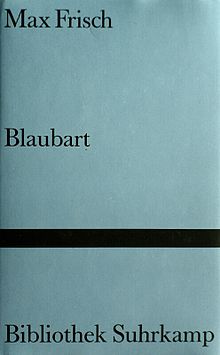 Book cover | |
| Author | Max Frisch |
|---|---|
| Original title | Blaubart |
| Translator | Geoffrey Skelton |
| Language | German |
| Publisher | Suhrkamp Verlag |
Publication date | 1982 |
| Publication place | Germany |
Published in English | 1982 |
| Pages | 171 |
| ISBN | 3518028448 |
Bluebeard (German : Blaubart) is a 1982 novel by the Swiss writer Max Frisch. It tells the story of a medical doctor who is accused of murdering his ex-wife. It was Frisch's last novel.